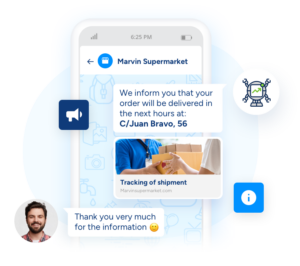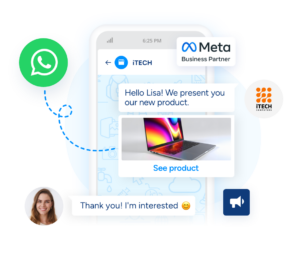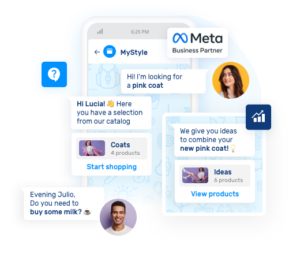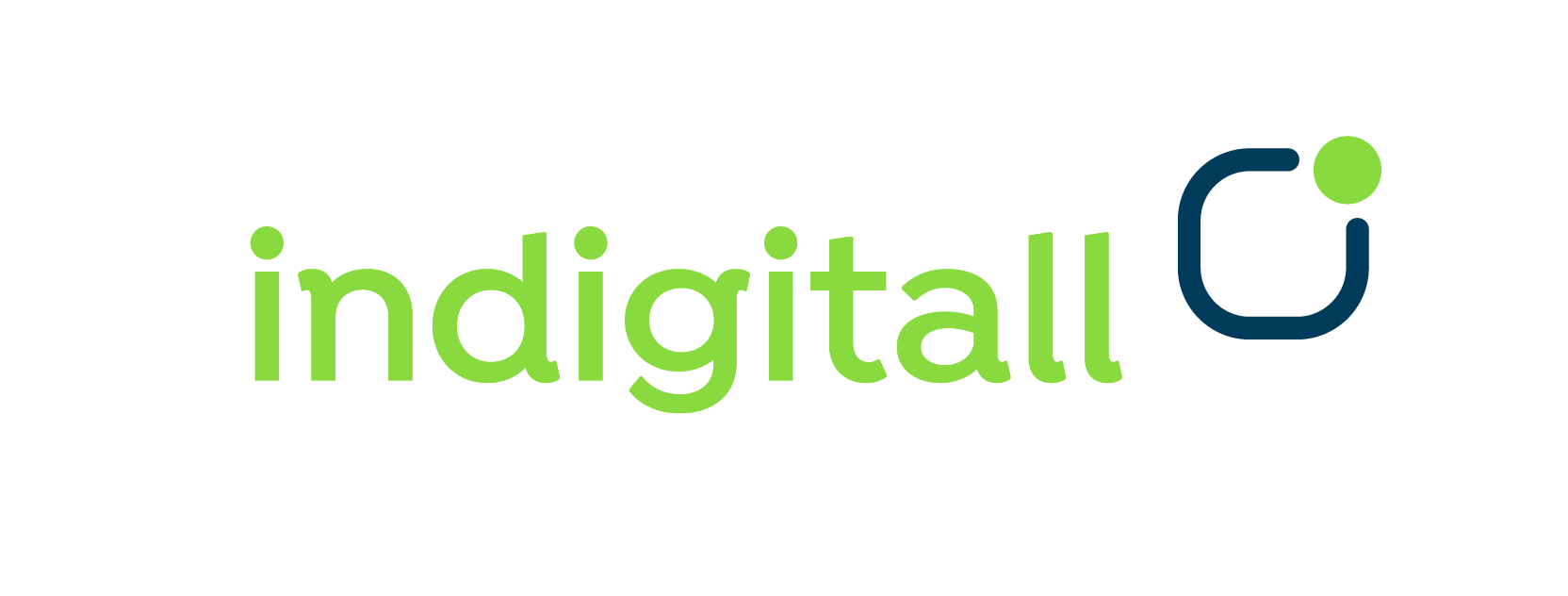
WhatsApp Integration: Everything You Need to Know
Overview
- WhatsApp Business API vs WhatsApp Business: Which is Right For You?
- WhatsApp Bot Development: From Concept to Launch
- WhatsApp in Spain: How Has Its Usage Evolved?
- Mobile Marketing: The Revolution in the Age of Connectivity
- Meta and indigitall join in partnership for the development of WhatsApp Business API solutions
WhatsApp Integration: Improving your Customer Engagement
Businesses are constantly seeking innovative ways to connect with their customers. One powerful tool that has emerged as a game-changer in customer engagement is WhatsApp integration. By leveraging the world's most popular messaging app, companies can create more personalized, immediate, and effective communication channels with their audience. In this blog, we'll explore the benefits of using indigitall's WhatsApp integration and how it can revolutionize your customer engagement strategy.
What is a WhatsApp integration?

A WhatsApp integration refers to the process of connecting the WhatsApp messaging platform with other applications or services to enhance communication and streamline processes. This integration can be particularly beneficial for businesses, allowing them to manage customer interactions more efficiently.
For instance, by integrating WhatsApp with customer engagement platforms like indigitall, companies can respond to inquiries directly from their helpdesk, automating responses to common questions and improving overall customer support efficiency Additionally, tools like indigitall can be integrated with WhatsApp Business to automate message creation and facilitate personalized customer interactions, further enhancing the user experience. Overall, WhatsApp integrations enable seamless communication across various channels, making it easier for businesses to engage with their customers in a timely and effective manner.
Why Whatsapp for the US?
WhatsApp usage in the United States has been steadily growing, with the platform recently reaching a significant milestone of 100 million users across the country. This achievement marks a turning point for WhatsApp in the American market, where it has traditionally lagged behind other messaging platforms. Despite its global popularity, WhatsApp has faced challenges in gaining widespread adoption in the U.S., primarily due to the prevalence of unlimited SMS plans and the dominance of iMessage among iPhone users. However, the app's cross-platform capabilities, enhanced features, and end-to-end encryption are gradually attracting more American users, particularly those with international connections or those seeking a more feature-rich messaging experience. While WhatsApp's conversion rates in the U.S. may not match its rapid adoption in other parts of the world, its growing user base suggests an increasing acceptance of the platform as a viable alternative to traditional texting and other messaging apps.

Benefits of WhatsApp Integration with Indigitall
- Enhanced Customer Service
- WhatsApp integration allows businesses to provide real-time, personalized customer support. Customers can easily reach out with questions or concerns, and businesses can respond promptly, improving overall satisfaction and loyalty.
- Increased Engagement Rates
- WhatsApp messages have significantly higher open and response rates compared to traditional channels like email. This increased engagement can lead to better conversion rates and more effective marketing campaigns.
- Cost-Effective Communication
- Compared to SMS or phone calls, WhatsApp messaging is a cost-effective way to communicate with customers. This can result in significant savings for businesses, especially those with a large customer base.
- Rich Media Capabilities
- WhatsApp supports various media types, including images, videos, and documents. This allows businesses to share product catalogs, how-to guides, and other rich content directly with customers, enhancing the overall communication experience.
- Improved Customer Experience
- By offering a familiar and convenient communication channel, businesses can provide a seamless and user-friendly experience for their customers. This can lead to increased customer satisfaction and loyalty.
- Automated Messaging
- With Indigitall's WhatsApp integration, businesses can set up automated responses and chatbots to handle common inquiries, freeing up human agents to focus on more complex issues.
- Personalized Marketing
- WhatsApp integration allows for highly targeted and personalized marketing messages. Businesses can send tailored offers, product recommendations, and updates based on customer preferences and behavior.
- Secure Communication
- WhatsApp's end-to-end encryption ensures that customer communications remain private and secure, building trust and confidence in your brand.
- Analytics and Insights
- Indigitall's WhatsApp integration provides valuable analytics on message performance, customer engagement, and other key metrics. These insights can help businesses refine their communication strategies and improve overall effectiveness.

Use Cases for WhatsApp Integration
WhatsApp integration offers businesses versatile ways to gain users, improve customer experiences, and drive revenume. Here are some key use cases:
Customer Support
- Real-time Assistance: Provide instant responses to customer queries, troubleshoot issues, and offer product guidance.
- Multimedia Support: Share images, videos, and documents to better explain solutions or product features.
- Chatbots: Implement AI-powered chatbots to handle common inquiries 24/7, freeing up human agents for complex issues.
Order Management
- Order Confirmations: Send automated messages confirming order details and payment receipt.
- Shipping Updates: Provide real-time tracking information and delivery notifications.
- Return and Exchange Requests: Process and manage return or exchange requests directly through WhatsApp.
Appointment Scheduling
- Booking Confirmations: Send automated appointment confirmations and reminders.
- Rescheduling: Allow customers to easily reschedule or cancel appointments via WhatsApp.
- Follow-ups: Send post-appointment feedback requests or follow-up care instructions.
Marketing and Promotions
- Personalized Offers: Send targeted promotional messages based on customer preferences and purchase history.
- Product Launches: Notify customers about new products or services.
- Abandoned Cart Recovery: Send reminders about items left in shopping carts.
Transactional Notifications
- Payment Reminders: Send automated payment due notifications for subscriptions or installments.
- Account Updates: Notify customers about account changes, balance updates, or security alerts.
- Loyalty Program Updates: Inform customers about points earned, rewards available, or membership status changes.
Feedback Collection
- Surveys: Conduct customer satisfaction surveys or product feedback questionnaires.
- Review Requests: Encourage customers to leave reviews for products or services.
- Net Promoter Score (NPS): Gather NPS data to measure customer loyalty and satisfaction.
Internal Communication
- Team Collaboration: Facilitate quick communication between team members for efficient problem-solving.
- Shift Notifications: Send automated messages about shift schedules or changes to employees.
- Emergency Alerts: Quickly disseminate important information to staff during critical situations.
Best Practices for Integration
To make the most of your WhatsApp integration, consider these best practices:
- Obtain explicit consent from customers before sending WhatsApp messages.
- Use message templates strategically to ensure compliance and improve delivery rates.
- Personalize messages using customer data to increase relevance and engagement.
- Monitor analytics regularly to optimize your messaging strategy.
- Combine automated responses with human support for the best customer experience.
- Keep your product catalog up-to-date to ensure accurate information in commerce messages.
Measuring Success for WhatsApp Integration
To evaluate the effectiveness of your WhatsApp integration, it's crucial to track key performance indicators (KPIs) and analyze relevant metrics. This data-driven approach will help you optimize your WhatsApp strategy and improve customer engagement.
Key Metrics to Track
- Delivery Rate
- Formula: (Number of messages delivered / Total messages sent) x 100%
- Benchmark: 90-95%
- Measures the efficiency of message delivery and identifies potential technical issues.
- Open Rate
- Formula: (Number of opens / Total messages delivered) x 100%
- Benchmark: 85-95%
- Indicates how compelling your message content is to recipients.
- Click-Through Rate (CTR)
- Formula: (Number of clicks / Total messages delivered) x 100%
- Benchmark: 15-20%
- Assesses the effectiveness of your call-to-actions (CTAs) within messages.
- Conversion Rate
- Formula: (Number of desired actions / Total messages delivered) x 100%
- Benchmark: 45-60%
- Tracks recipients who completed a desired action, such as making a purchase.
- Response Rate
- Formula: (Number of responses / Total messages delivered) x 100%
- Benchmark: 35-40%
- Measures user engagement and the effectiveness of your messaging strategy.
- Average Response Time
- Tracks how quickly your team responds to customer inquiries.
- Aim for the shortest possible response time to improve customer satisfaction.
Advanced Metrics
- Revenue per Conversation (RPC)
- Formula: Total revenue / Total messages delivered
- Provides insights into the average revenue generated from each recipient.
- Cost per Recipient
- Formula: (WhatsApp marketing conversation cost + Software provider cost) / Total messages delivered
- Helps understand the efficiency of your WhatsApp marketing campaign spending.
- Return on Campaign Spend (ROCS)
- Formula: Revenue per recipient / Cost per recipient
- Gives a holistic view of your WhatsApp marketing campaign profitability.
Future Trends in WhatsApp Integration
As businesses continue to leverage WhatsApp for customer communication, several trends are emerging that will shape the future of WhatsApp integration:
- AI-Powered Chatbots and Natural Language Processing
- Advanced AI and natural language processing will enable more sophisticated chatbots that can handle complex queries and provide personalized responses. These chatbots will be able to understand context, sentiment, and intent, offering a more human-like interaction.
- Enhanced Analytics and Insights
- Future integrations will focus on providing deeper analytics and insights from WhatsApp interactions. Businesses will be able to gain valuable data on customer behavior, preferences, and trends, enabling more targeted and effective communication strategies.
- Omnichannel Integration
- WhatsApp will become a key component in omnichannel customer service strategies. Seamless integration with other communication channels like email, social media, and voice will provide a unified customer experience across all touchpoints.p.
- Enhanced Security Measures
- As data privacy concerns grow, future integrations will focus on advanced encryption, secure authentication methods, and compliance with evolving data protection regulations.
- Predictive Customer Service
- AI-driven predictive analytics will enable businesses to anticipate customer needs and proactively offer support or relevant information before the customer even reaches out.
- Customizable Business Solutions
- WhatsApp will likely offer more tailored solutions for different industries, allowing businesses to create custom integrations and features specific to their sector's needs.
By following these trends and guidelines and leveraging the full capabilities of Indigitall's WhatsApp integration, businesses can significantly enhance their customer engagement, streamline communication, and drive growth through this powerful messaging platform.
In conclusion, WhatsApp integration offers a wealth of opportunities for businesses to connect with customers in a more personal, efficient, and effective manner. By embracing this technology and implementing it thoughtfully, companies can stay ahead of the curve in customer engagement and build stronger, more lasting relationships with their audience.


